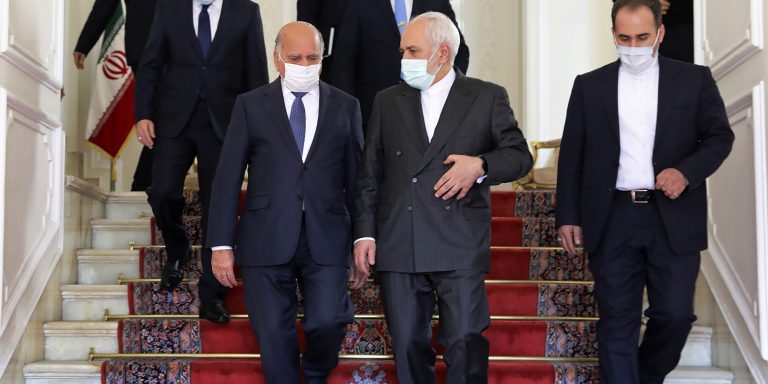INTELBRIEF
April 13, 2021
IntelBrief: The Scramble for Iraq Heats Up

Bottom Line Up Front
- The United States and Arab partners are competing with Iran to exercise preponderant control over Iraqi government decision-making.
- A joint U.S.-Iraq statement on the U.S. military presence highlights the pressure Tehran is exerting on Iraq’s government to limit U.S. influence.
- Within Iraq, militias backed by Iran remain powerful actors but are losing public support over their widespread abuses of the population.
- Several U.S. allies have renewed efforts to exert influence in Iraq to help counter Iranian influence, but prospects for success remain uncertain.
The United States and Iraq’s Arab neighbors are working to counter Iran’s influence over Iraqi decision-making at all levels of government. Acting through a wide network of Shia militias that report to Iran’s Islamic Revolutionary Guard Corps – Qods Force (IRGC-QF), Iran continues to pressure Iraq to remain in its orbit and instigates attacks against the 2,500 U.S. military personnel remaining in Iraq. In March, some of the Iran-backed militias openly threatened Iraqi Prime Minister Mustafa al-Kadhimi, who is perceived as aligned with the United States. To a large extent cowed by the militia threats, al-Kadhimi requested another U.S.-Iraq Strategic Dialogue, which took place by videoconference on April 7. The joint statement issued at the conclusion of the dialogue stated that U.S. forces in Iraq would transition to a purely support and advisory role and that there would be a “redeployment of any remaining [U.S.] combat forces from Iraq, with the timing to be established in upcoming technical talks.”
The statement further accommodated Iran by stating that “the bases on which U.S. and Coalition personnel are present are Iraqi bases and their presence is solely in support of Iraq’s effort in the fight against ISIS.” The wording clearly expresses the Iraqi view that the U.S. should not use its presence in Iraq to launch attacks on Iran or Iran-backed forces in Iraq, as the Trump administration did, most notably in its strike that killed IRGC-QF commander Qasem Soleimani in January 2020. The Iraqi government and the Biden administration appear to agree that Iraq should not be an arena for U.S.-Iran confrontation and that the Iran-backed militias will continue losing popularity in Iraq through their own actions. Many Iraqis blame the militias for corruption, for suppressing significant anti-government demonstrations in October 2019, and for failing to fulfill financial promises to families of recruits who died fighting the Islamic State.
Within the Biden administration, there is some continuity of the Trump era policy of working with some regional Arab states to bring Iraq out of Iran’s orbit and into the Arab fold. In early April, al-Kadhimi visited Saudi Arabia and the United Arab Emirates to discuss increasing economic cooperation, including advancing a longstanding U.S.-backed plan for the Gulf states to replace Iran as Iraq’s main natural gas supplier. During meetings in Riyadh, Saudi leaders agreed to form a joint $3 billion fund for investments in Iraqi infrastructure – a financial benefit that Iran is unable to match. The UAE is reportedly helping Iraq to secure firm government control over border crossings and marginalize the Shia militias’ ability to siphon off state customs revenues. Jordan and Egypt are reportedly continuing talks with Iraq on strategic and economic cooperation; these talks began in the final year of the Trump administration but appear to have Biden administration backing, as well. Qatar is engaging Baghdad in discussions on enhanced economic cooperation, although Qatar maintains ties with Iran and its engagement with Iraq is not deliberately directed at undermining Iranian influence in Iraq.
The renewed Arab efforts to wean Iraq away from Iran’s sphere of influence appear to be faring no better than previous such initiatives. Kuwait has been engaging Iraq extensively and consistently since the 2003 U.S. invasion that ousted Saddam Hussein, but the relationship has not expanded beyond rebuilding the trust that was destroyed by Iraq’s 1990 invasion. Saudi Arabia has repeatedly sought to engage powerful Iraqi Shia leaders, including hosting the powerful cleric Moqtada Al Sadr on a 2017 visit. Aside from obtaining his help in reducing anti-Saudi sentiment among his followers, the Saudi leadership did not succeed in aligning him or other Iraqi Shia leaders with broader Arab interests.
One headwind against greater Arab state influence in Iraq is continuing Iraqi public resentment over the refusal of the Gulf states to conduct airstrikes against the Islamic State fighters in Iraq, instead confining their air operations to Syria. By contrast, Iran intervened extensively and immediately to help beleaguered Iraqi forces after the Islamic State offensive caused Iraqi government forces to collapse in 2014. Arab engagement with Iraqi leaders might help calm regional tensions and establish additional diplomatic bridges to Tehran. However, it seems doubtful that the Biden administration and its Arab allies have developed a clear pathway to weaken the deep and multifaceted grip that Iran maintains over key actors and power centers in Iraq.